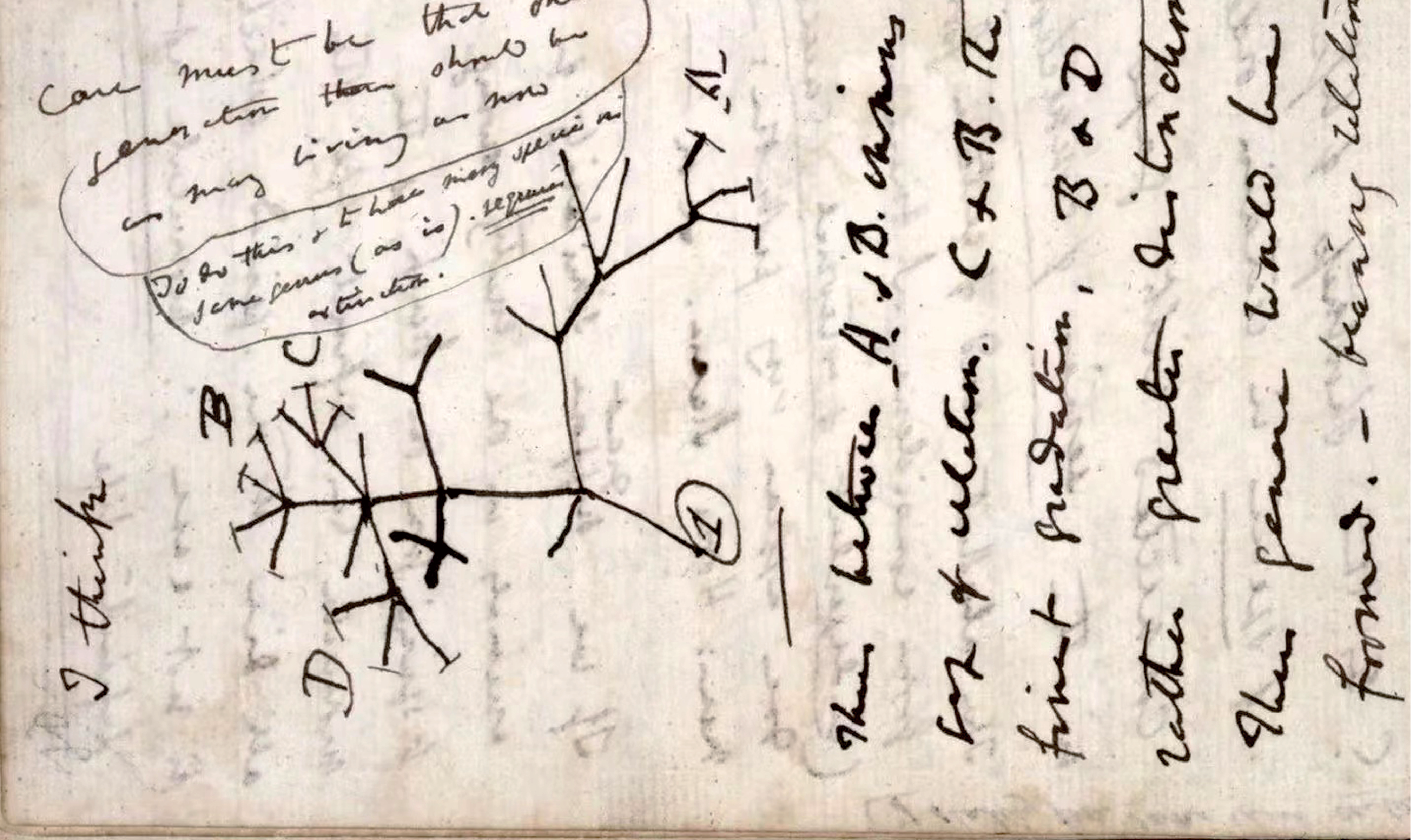Four
Focus
Wanglaoji Herbal Tea
becoming the No.1 can of Chinese beverage by focusing on 4 areas
“Strategy is not predicting the future. Instead, it's about making decisions today to be ready for an uncertain tomorrow.”
⸺Peter Drucker
After seizing the trend, choosing the right timing and designing growth plan, company needs to focus – focusing on current situation, focusing core business, focusing on main markets and focusing on strategic areas without wasting strategic resources on non-strategic opportunities. Instead, company should put its Van Fleet Load on strategic opportunities with full power and ultimate attack to achieve breakthrough.
How did Coca-Cola become the most successful beverage brand in the world? The answer is focus.
Coca-Cola was born in 1886; Sprite was launched in 1961. During as long as 75 years, Coca-Cola company focused on the one and only brand – Coca-Cola.
Coca-Cola was born out of the functional need of medicine. In 1886, basing on the popular Vin Mariani (a French-Corsican coca wine), American pharmacist John Pemberton created an antitussives and analgesic syrup by removing the alcohol. Pemberton packaged the syrup into small jugs and sold them in nearby pharmacies. This was the prototype of the modern Coca-Cola drink. Coca-Cola was born during the period of temperance movement. Coca-Cola became the best substitution of alcoholic drinks as it was a nonalcoholic version of Vin Mariani. Coca-Cola was marketed as “the temperance drink”, appealing to many people and helped to drive its sales. In 1888, Asa Candler acquired a stake in Pemberton's company as he saw potentiality of Coca-Cola, owning the rights of production and sales. Candler began to sell the syrup to many other pharmacies and promote Coca-Cola with the slogan of “Delicious and Refreshing, Drink Coca-Cola”, which lasts up till now.
In 1899, Coca-Cola company started to franchise bottled Coca-Cola drink, which was an instant success. In 1915, the Coca-Cola Bottler invited the all glass manufacturers across the United States to design “new bottle, a distinctive package”– “a bottle so distinct that it could be recognized by touch in the dark of lying broken on the ground”.
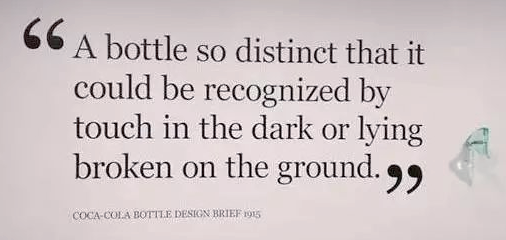
Illustration 4.1 A Bottle so Distinct that it could be Recognized by Touch in the Dark or Lying Broken on the Ground.
The Root Glass Company submitted the design of Contour Bottle. On 16th November 1915, the Contour Bottle patent was granted. The date was later incorporated into the lettering on the final design of the bottle. In order to adapt to the bottling production facilities, the design was slightly modified into a slimmer design and put into mass-production in 1916.
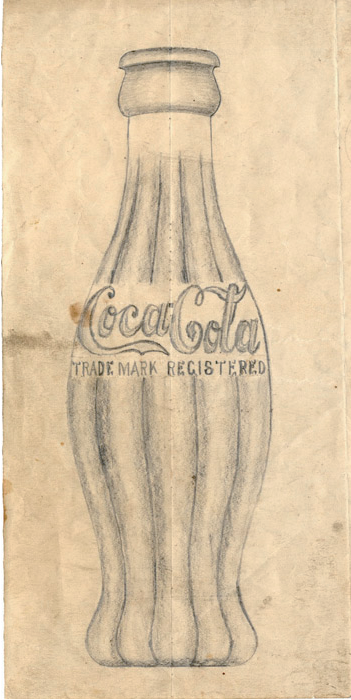
Illustration 4.2 The Manuscript of Contour Bottle
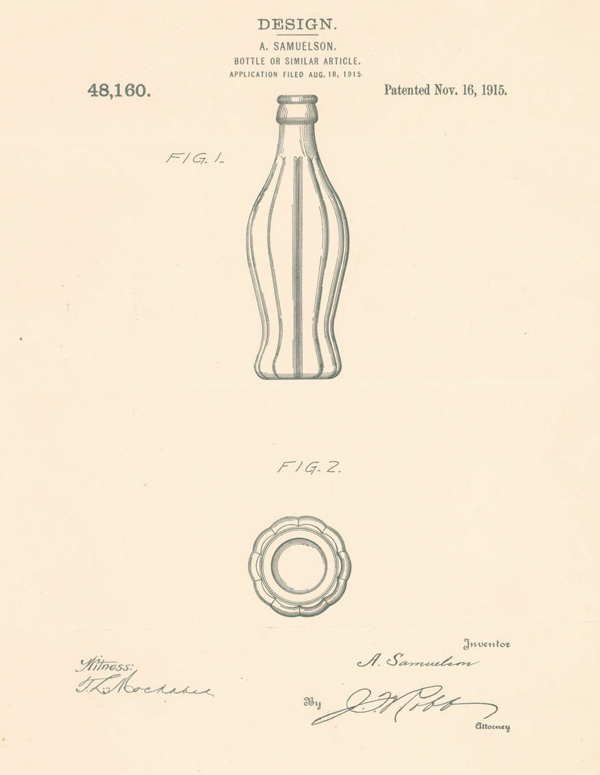
Illustration 4.3 The Patent of Coca-Cola Contour Bottle Designed in 1915
For the following 40 years, the Contour Bottle was the only package for Coca-Cola Company, who only introduced extra-large packaging until 1955. In 1950, Coca-Cola Contour Bottle was the only commercial product appearing on the cover of Times Magazine. In 1960, the Coca-Cola Contour Bottle became a registered trademark granted by United States Patent and Trademark Office. Even up till now, the Contour Bottle is still the most widely recognized packaging in the world. The contour design is applied to new aluminum bottle as well as 2L family format. Since its birth in 1915, Coca-Cola focuses on the Contour Bottle for over one century.
As a legendary figure, Santa Claus has been depicted differently in height, weight and clothing styles worldwide for hundreds of years without a universal image. In 1931, Coca-Cola Company created a plump, beer-bellied and dressed in a typical Coca-Cola red colored coat Santa Claus in its advertisements. For the following decades, Coca-Cola constantly kept promoting this Santa Claus image, successfully convincing people worldwide to take it as the real image of Santa Claus. Nowadays, when children around the world think of Santa Claus, the image that comes to their mind is not the original legendary one, but the one deliberately crafted and disseminated by Coca-Cola.
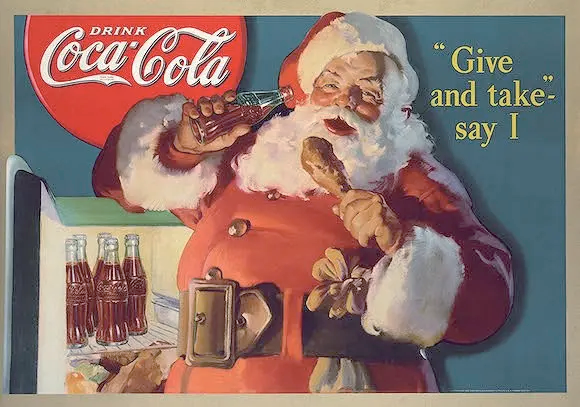
Illustration 4.4 The Coca-Cola Santa Claus Image has been Recognized Globally
During World War II, the US military issued a nationwide call for resources and supplies. Coca-Cola became an essential military provision to American soldiers fighting across the world. In 1943, General Eisenhower sent an urgent cablegram to the logistics department himself requesting that “We need Coke badly. Ship 3 million bottled Coca-Cola (filled).” Because of World War II, Coca-Cola successfully entered the European, African and Asian markets. After the war, the United States emerged as a global leader. As a symbol of freedom and part of the popular culture in the United States, Coca-Cola became the best-selling drink around the world.
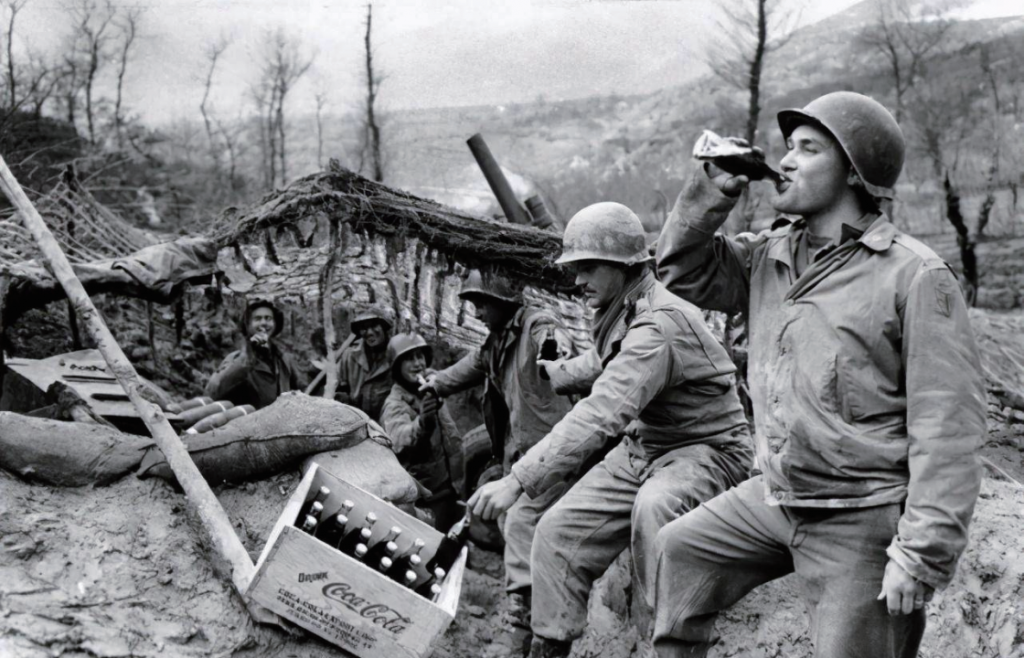
Illustration 4.5 On the Battlefield of World War II, Coca-Cola became an Essential Military Provision for the Armed Forces.
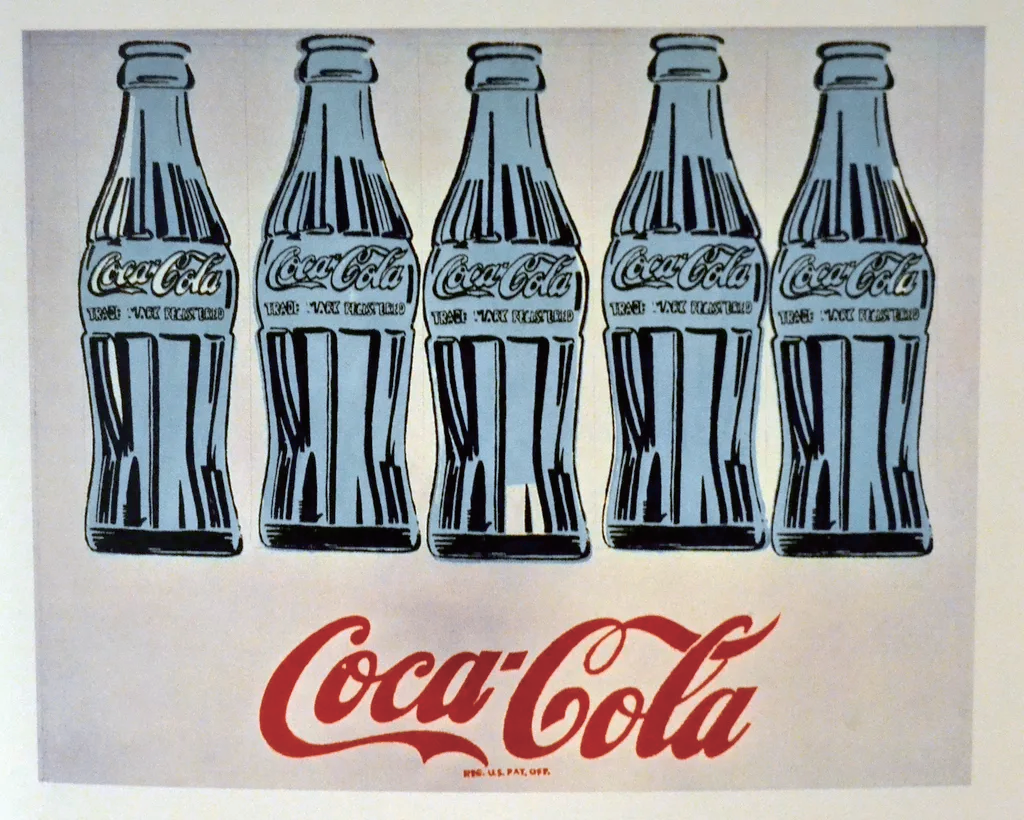
Illustration 4.6 The Artwork Coca-Cola by Andy Warhol
Throughout the history of Coca-Cola Company, we can notice that its focuses on key strategic areas – product packaging, brand image and corporate culture – is the fundamental reason how Coca-Cola has become the global best-selling beverage brand.
Since 2003, we have been accompanying the Wanglaoji brand for 20 years, deeply involved in several major milestones of its history. During this time, there have been changes in the ownership of the Wanglaoji brand, from Jiaduobao to Guangzhou Pharmaceutical Group, nevertheless the brand itself always has been focusing on four key areas.
1. Always focusing on the Red Can
Just like the Contour Bottle of Coca-Cola, the red can is the visual hammer of Wanglaoji. During the herbal tea competition battle, Jiaduobao once switched to the gold can, while Wanglaoji always focuses on the red can by promoting it as the best-selling item. The red can of Wanglaoji is in the center of any communications materials. With 20 years of consistent communication, the red can has become a valuable part of brand equity of Wanglaoji.
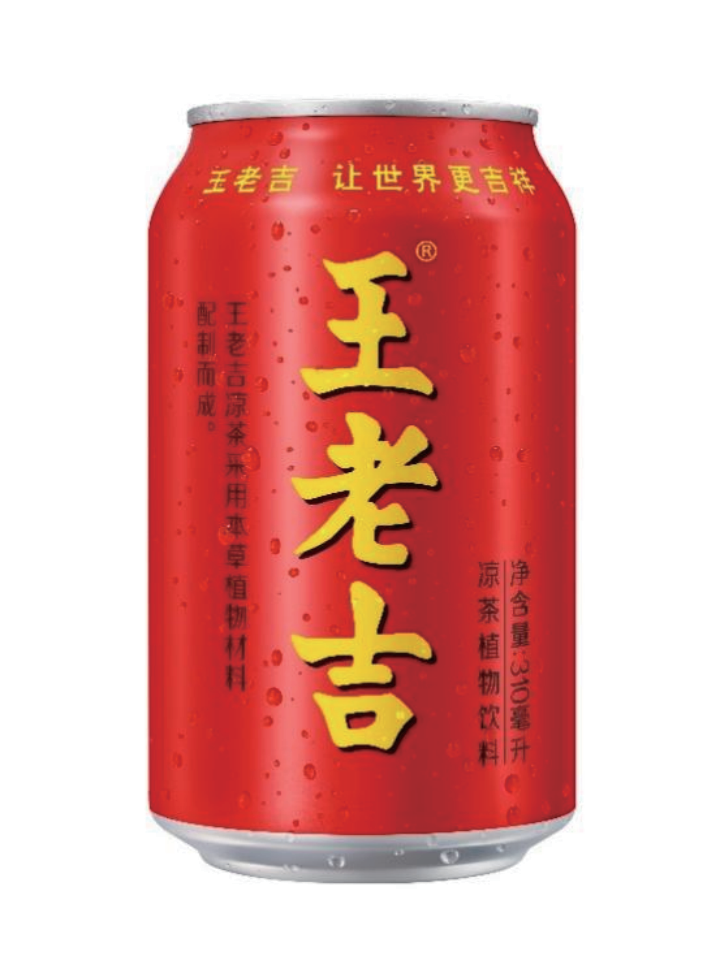
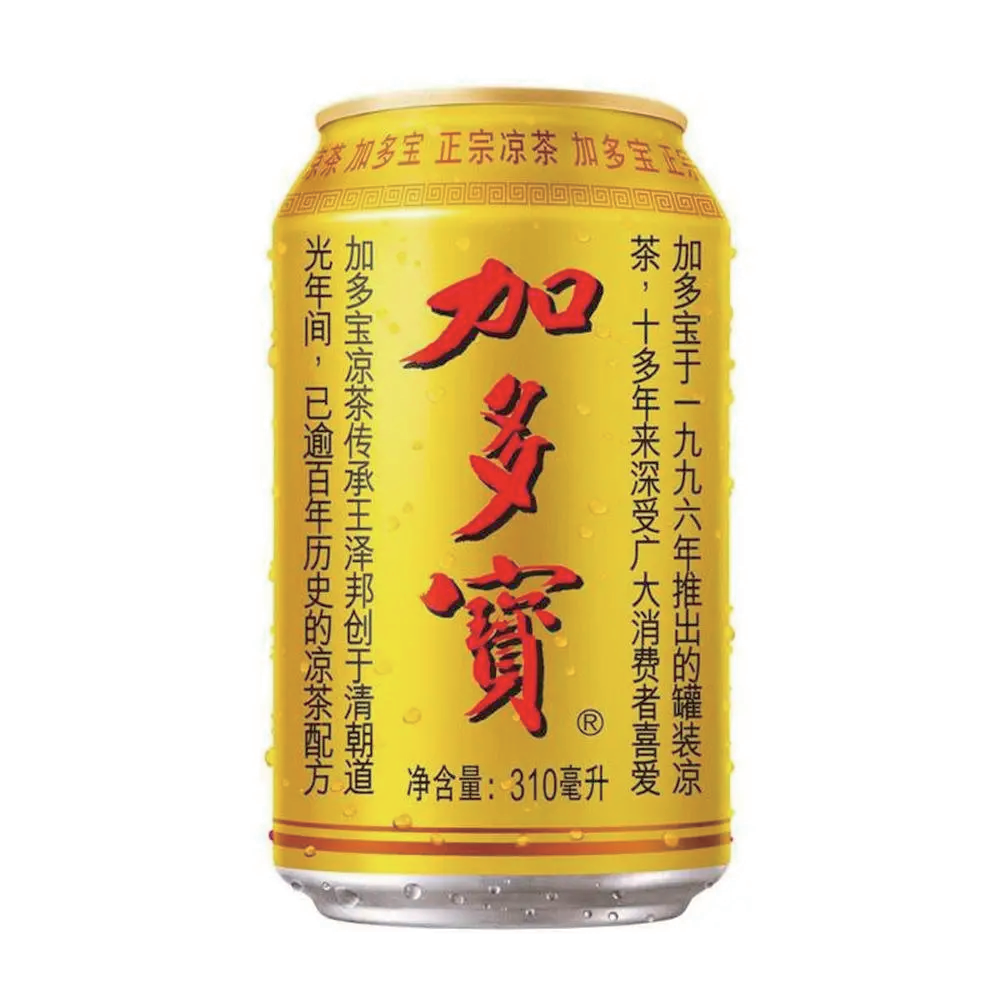
Illustration 4.7 Wanglaoji Red Can format has been Used for 20 Years since Launch
2. Always focusing on the positioning of “To Prevent Inner Heat, Drink Wanglaoji”
Herbal tea is a specialty beverage in Guangdong province in China. In the minds of Guangdong consumers, herbal tea is a medicinal drink with functions such as clearing heat and toxins, removing dampness and relieving the syndrome of cold. In Guangdong, herbal tea is normally sold in tea stores while brewing. As a local brand in Guangdong, its can format was initially sold with the communication theme of "Wanglaoji – the righteousness of the heaven and the earth". In 2003, Wanglaoji had a new positioning – strategically transforming from a local medicinal drink to a national "preventing inner heat beverage" with the new slogan "To prevent inner heat, drink Wanglaoji". From 2003 till now, Wanglaoji always focuses on the communication of “To prevent inner heat, drink Wanglaoji”.
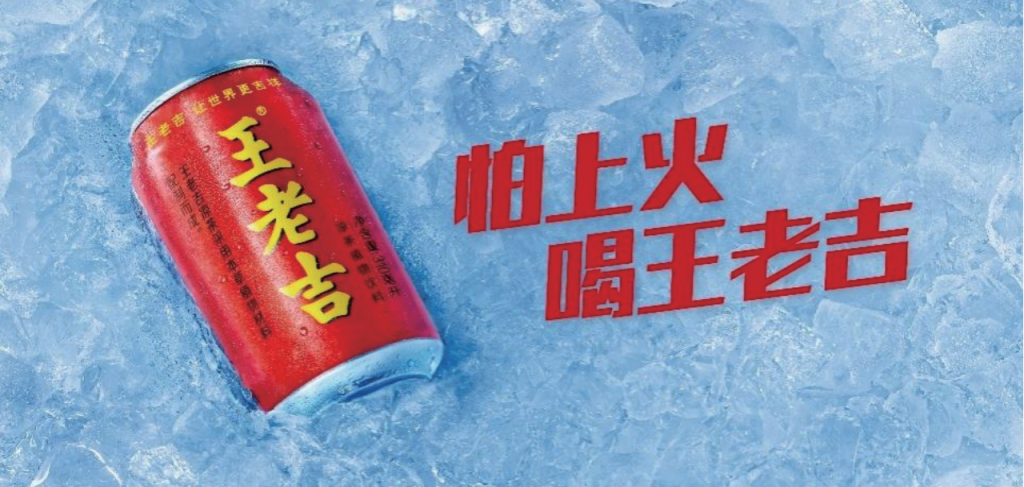
Illustration 4.8 “To Prevent Inner Heat, Drink Wang Lao Ji”
3. Always focusing on being the ambassador of Chinese Herbal Tea
The strength of a brand depends on the potentiality of the category it belongs to. The strength of the Wanglaoji brand depends on the potentiality of the herbal tea category. From the very first beginning, Wanglaoji has been committed to promoting the brand itself as well as the herbal tea category. As the leading brand in the herbal tea category, Wanglaoji lead the project of enrolling Guangdong Herbal Tea into China’s National Intangible Cultural Heritage list by working together with many other local herbal tea brands. On May 20th, 2006, herbal tea was approved by the State Council being listed as the first batch of National Intangible Cultural Heritage. Among the 21 herbal tea companies that were selected, there were regional brands from Guangdong such as Wanglaoji, Denglao, Baiyunshan, Xiasangju and Huangzhenglong etc.
Wanglaoji is the biggest contributor to the herbal tea being selected into China’s National Intangible Cultural Heritage list. Meanwhile, Wanglaoji, the leading brand in the herbal tea category, is also the biggest beneficiary with the herbal tea category becoming more widely known.
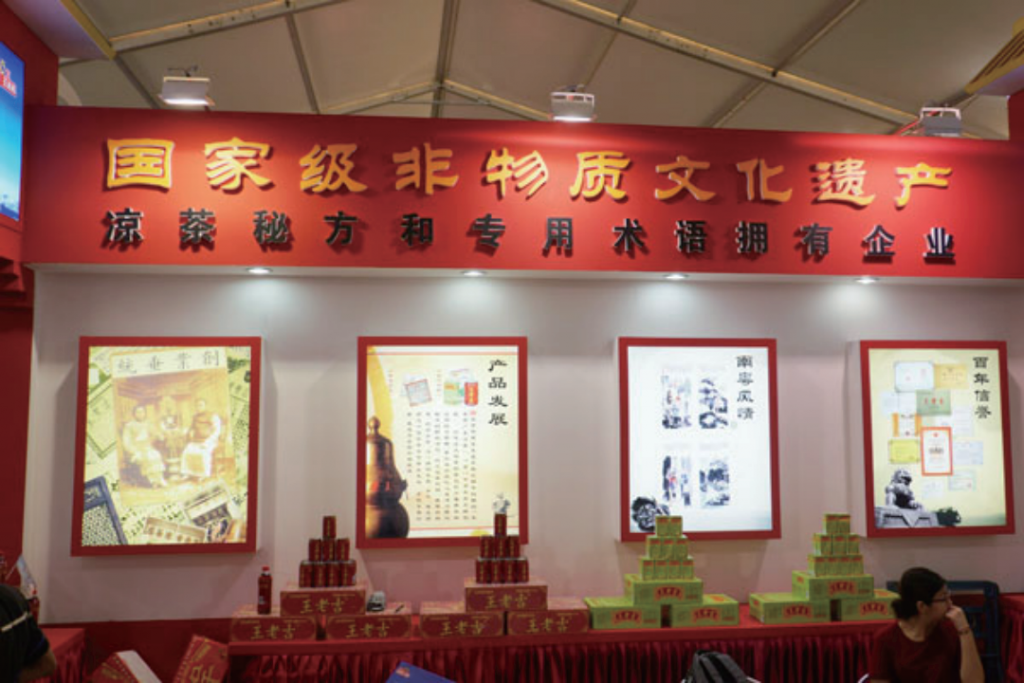
Illustration 4.9 In 2006, Approved by the State Council, Wanglaoji was Listed as the First Batch of National Intangible Cultural Heritage
4. Always focusing on building a global brand
After establishing brand awareness in the domestic market, Wanglaoji realized that globalization is another rewarding opportunity for all Chinese brands as well as for itself. The advantages of building a global brand are – having positive effects on domestic market, fortifying the domestic leadership position, and making Chinese consumers be proud of Wanglaoji.In order to better promote the herbal tea culture and the "Ji culture" globally, Wanglaoji has built 12 herbal tea museums around the world, including China, the United States, Japan etc. According to its plan, Wanglaoji will build 56 herbal tea museums in total around the world to open the dialogues between the world and the traditional Chinese medicine culture and "Ji culture", and eventually to make global consumers appreciate the beauty of the Chinese herbal tea. After several years of efforts, Wanglaoji has become one of the most popular Chinese beverage brands in the European and American markets. To further tap into the mainstream European and American markets, the Wang & Partners Innovation team collaborated with Wanglaoji team to re-brand into Walovi due to the difficulty in pronouncing Wanglaoji in English.
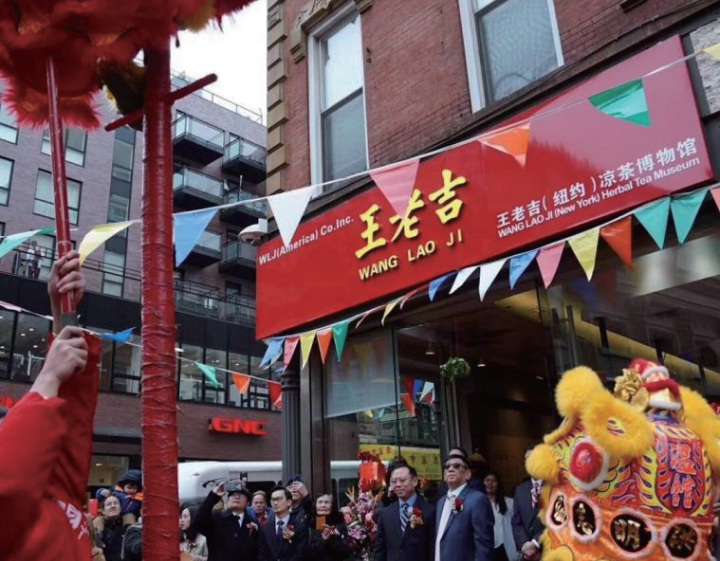
Illustration 4.10 In 2018, the First Oversea Herbal Tea Museum of Wanglaoji Opening in Manhattan, New York
In 1987, the famous director Stanley Kwan directed a film called Rouge, in which there is a scene that the protagonist Fleur played by Anita Mui comes to the newspaper office of Yuen (played by Alex Man) to search for her lost lover Chan (played by Leslie Cheung). Yuen hands Fleur a can of Coca-Cola and says "Coca-Cola, the oversea version of Wanglaoji." By always focusing on the red can format, focusing on the positioning "To prevent inner heat, drink Wanglaoji", focusing on being the ambassador of Chinese herbal tea and focusing on building a global brand, we believe that Wanglaoji will become a name card for Chinese beverages and create "China's Coca-Cola, the world's Wanglaoji" at a global scale, just like the line from the movie.


